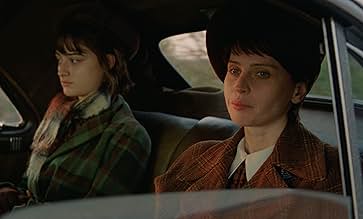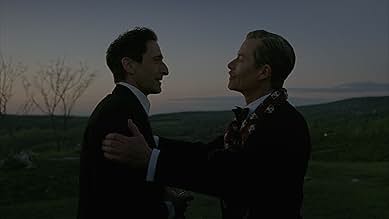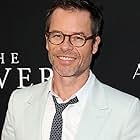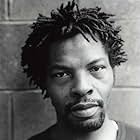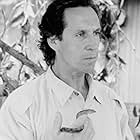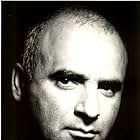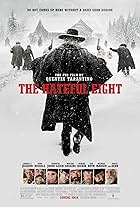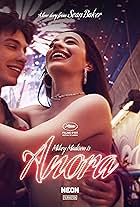When a visionary architect and his wife flee post-war Europe in 1947 to rebuild their legacy and witness the birth of modern United States, their lives are changed forever by a mysterious, w... Read allWhen a visionary architect and his wife flee post-war Europe in 1947 to rebuild their legacy and witness the birth of modern United States, their lives are changed forever by a mysterious, wealthy client.When a visionary architect and his wife flee post-war Europe in 1947 to rebuild their legacy and witness the birth of modern United States, their lives are changed forever by a mysterious, wealthy client.
- Nominated for 9 BAFTA Awards
- 83 wins & 281 nominations total
- Director
- Writers
- All cast & crew
- Production, box office & more at IMDbPro
Storyline
Did you know
- TriviaThis movie has an intermission built into the actual 70mm film reel that counts down from fifteen minutes. It's the first movie to have an intermission since the 70mm roadshow release of The Hateful Eight (2015).
- GoofsThroughout the film, László is seen sketching, writing and leading with his right hand. At the end of the first part of the film, however, a tight shot depicts a left-handed person who is implied to be László writing a letter to Erzsébet.
- Quotes
[last lines]
Older Zsofia: My uncle is, above all, a principled artist. His lifelong ambition was not only to define an epoch but to transcend all time. In his memoirs, he described his designs as machines with no superfluous parts, that at their best, at his best, possessed an immoveable core; a "Hard Core of Beauty." A way of directing their inhabitant's perception to the world as it is. The inherent laws of concrete things such as mountains and rock define them. They indicate nothing. They tell nothing. They simply are. Born in 1911 in a small fishing village in Austria-Hungary, László Toth looked out upon the Adriatic Sea. He was a boy with eyes wide open, full of yearning. New borders would eventually rip this expanse of sea away from him but never did he cease to try and fill its void. Forty years later, he survived the camps at Buchenwald, as did his late wife, and myself, in Dachau. His first American masterpiece, the Van Buren institute outside of Philadelphia, remained unfinished until 1973. The building referenced his time at Buchenwald as well as the deeply felt absence of his wife, my Aunt Erzsébet. For this project, he re-imagined the camp's claustrophobic interior cells with precisely the same dimensions as his own place of imprisonment, save for one electrifying exception; when visitors looked 20 meters upwards, the dramatic heights of the glass above them invited free thought; freedom of identity. He further re-imagined Buchenwald and his wife's venue of imprisonment in Dachau on the same grounds, connected by a myriad of secret corridors re-writing their history and transcending space and time so that he and Erzsébet would never be apart again. Uncle, you and Aunt Erzsébet once spoke for me, I speak for you now, and I am honored. "Don't let anyone fool you, Zsófia" he would say to me as a struggling young mother raising my daughter during our first years in Jerusalem, "no matter what the others try and sell you, it is the destination, not the journey." Thank you.
- ConnectionsFeatured in The Project: Episode dated 10 December 2024 (2024)
- SoundtracksOne for You, One for Me
Written by Carmelo La Bionda, Michelangelo La Bionda, & Richard Palmer-James
Performed by La Bionda
Direction - Great: The direction on a macroscale is grand as this movie feels like an epic that emulates films from the time period it portrays; the direction on a microscale is great as the interpersonal scenes really paint who these characters are and the struggles they go through; the storytelling is great, it tackles many serious topics in an artsy way, and the movie really does feel like a modern-day Godfather with how they told this epic; they build tension incredibly well as you genuinely experience second-hand trauma from what you see these characters experience
Story - Great: The concept is amazing, as the movie is an epic that displays the hardships of trying to live the 'American Dream', as we see through the lens of troubled László Toth; the plot structure is very good, as it emulates epics that were popular from the time-period the movie takes place in; the character writing is amazing, as László Toth has many dimensions to him, especially with all that he experiences as he goes through this movie, and the supporting cast really does have many dimensions to them as well
Screenplay - Great: The dialogue is polished and profound; the symbolism is incredibly profound as the movie tackles many hard topics like addiction, trauma, and the immigrant experience to show the protagonist's shell-shocked experience of trying to live the 'American Dream'; the foreshadowing is great as it is used well in conjunction with tension to build a captivating climax
Acting - Very Good: Adrien Brody - Incredible (Feels like an extension of his performance from "The Pianist" as he accurately and profoundly displays the trauma and addictions this character goes through as he tries to navigate his "American Dream"), Felicity Jones - Very Good (A powerful performance, as you can tell the hardships she has to go through to come to America; she has amazing chemistry with Brody), Guy Pearce - Great (A truly commanding figure as you always feel a sense of uneasiness around him; he has good chemistry with Brody as their dynamic makes you feel very invested in both characters), Joe Alwyn - Good (The typical spoiled, rich son does a good job supporting the rest of the cast), Isaach de Bankolé - Pretty Good (Has good chemistry with each other as both do a good job trying to display the hardships of trying to experience the 'American Dream'), Alessandro Nivola - Good (Does a good job showing how his character is able to code-switch and assimilate with American culture as he seamlessly transitions from his past and present when interacting with Brody), Rest of the cast - Pretty Good to Good (Everyone does their job as everyone feels experienced in trying to progress the movie forward; the cast has very good chemistry)
Score - Great: Paints this movie as an epic and is used well to establish the tone of the movie
Cinematography - Great: Paints this movie as an epic as it makes this movie feel like an art piece with how grand it is; does so much with both film and a low budget; the imagery for the movie really does feel amazing
Editing - Great: Really makes this movie feel like an art piece as it is seamless and used well in conjunction with the direction and cinematography
Sound - Good: It gives the movie a 1960s feel; it helps build tension
Production Design - Good: It helps in portraying the time period and the world László Toth deals with
Costumes - Good: Helps portray the time period
Pacing - Pacing is good as it adequately goes through the 3.5-hour runtime to create this grand epic
Climax - Climax is executed incredibly as the final 40 minutes before the epilogue really feel captivating in a traumatizing way; the epilogue is fine, but does not really feel like it ends the movie as strong as the second part
Tone - Tone is traditional to epics from the time period, and at some moments the style feels like a modern-day Godfather
Final Notes - I saw a premiere at the Austin Film Festival in 35mm film; it does so much with such a small budget; I have never been so impacted by a movie emotionally as I have been with this movie.
- cinemapersonified
- Nov 6, 2024
- Permalink
2025 Oscars: IMDb Editors' Predictions
2025 Oscars: IMDb Editors' Predictions
- How long is The Brutalist?Powered by Alexa
Details
- Release date
- Countries of origin
- Official site
- Languages
- Also known as
- El Brutalista
- Filming locations
- Production companies
- See more company credits at IMDbPro
Box office
- Budget
- $10,000,000 (estimated)
- Gross US & Canada
- $2,742,117
- Opening weekend US & Canada
- $266,791
- Dec 22, 2024
- Gross worldwide
- $2,751,317
- Runtime3 hours 34 minutes
- Color
- Sound mix
- Aspect ratio
- 1.66 : 1
Contribute to this page












